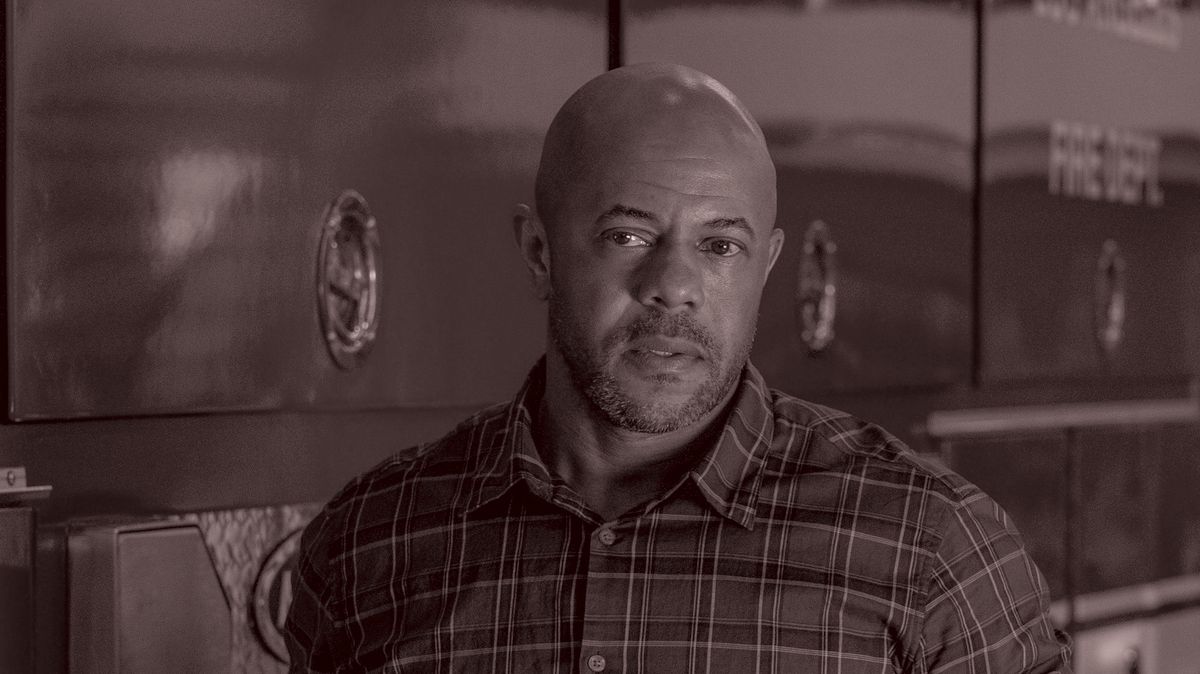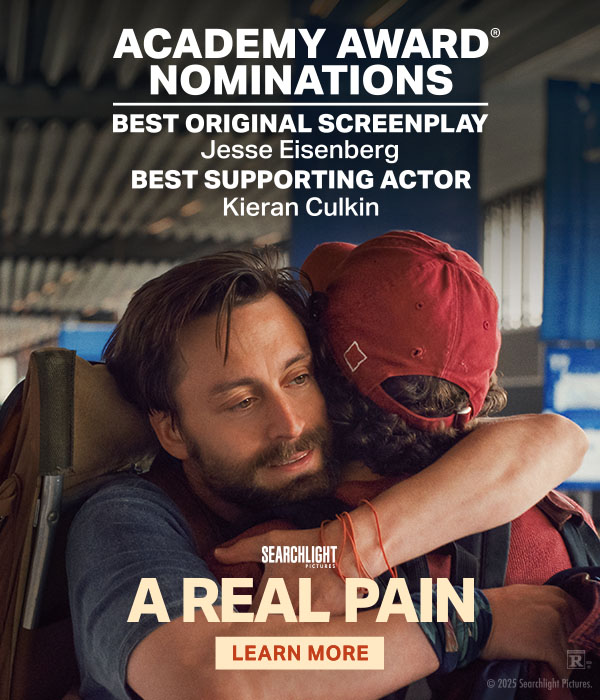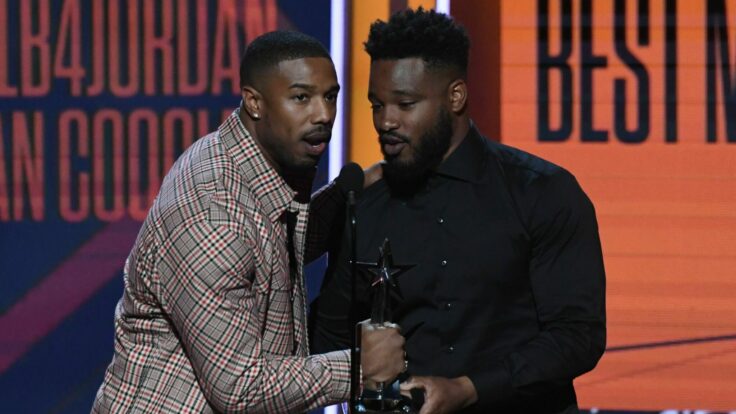Good evening, and welcome back to What I’m Hearing+, Tuesday’s supplemental brief
submitted in support of the WIH litigation. The left-leaning politics of Hollywood companies are being increasingly scrutinized amid the national “vibe shift” of Trump 2.0. Today, Eriq Gardner highlights two potentially damaging lawsuits against Disney over its Covid-era vaccine mandates. Plus, a bizarre twist in the Wendy Williams conservatorship drama, Elon’s Blade Runner problem, and the hottest A.I. case on the
copyright docket.
|
|
|
A MESSAGE FROM OUR SPONSOR
|
James Mangold’s A COMPLETE UNKNOWN starring Timothée Chalamet is “breathtaking cinema at the
highest level.”
Nominated for 8 Academy Awards® including Best Actor Timothée Chalamet, Best Supporting Actor Edward Norton, Best Supporting Actress Monica Barbaro, Best Director James Mangold, and Best Picture.
Watch a conversation with A COMPLETE UNKNOWN Writer/Director/Producer James Mangold and actors
Timothée Chalamet, Edward Norton, Elle Fanning, Monica Barbaro and Boyd Holbrook. [WATCH NOW]
|
|
|

|
Eriq Gardner
|
|
- Zuckerberg’s
“criminal” copyright scheme?: Last week, Mark Zuckerberg went to the White House to discuss tech leadership, a timely visit following his appearance on billionaires’ row at Trump’s inauguration. I’m guessing he had a lot on his mind. For starters, of course, there’s the Federal Trade Commission’s ongoing action against Meta, initiated by former chairwoman Lina Khan, to force the company to divest Instagram and WhatsApp. But there’s also the
ongoing A.I.-themed civil lawsuit against Meta, brought by Sarah Silverman, Ta-Nehisi Coates, and other authors, which claims that Meta trampled over copyright law by training its Llama L.L.M. on their books. While there’s plenty of litigation these days over copyright and fair use, here Meta stands accused of vacuuming up millions of books via torrent networks and knowingly distributing them to others. And that, sports fans, is where we veer into
possible criminal territory.
Last month, David Boies, the plaintiffs’ big-ticket litigator, amended the class action to include the allegation that Meta downloaded pirated books, stripped copyright markers using specialized software, and then “seeded” the books to other users worldwide. Even more damningly, Boies’ team says they have proof that Zuckerberg personally approved the use of a pirated dataset, despite internal concerns. This is where things get really
interesting: The plaintiffs are invoking the crime-fraud exception to attorney-client privilege, and pushing to read communications involving Meta’s in-house lawyers. The plaintiffs argue that, “Vastly smaller acts of data piracy … have resulted in Judges referring the conduct to the U.S. Attorneys’ office for criminal investigation.”
No surprise, Meta has dismissed these allegations as an overblown distraction. But last Tuesday, District Court Judge Vince Chhabria ruled
that the crime-fraud exception could apply, and ordered Meta to submit documents for his review. He’ll next determine whether Meta’s lawyers were complicit in a criminal copyright scheme. A decision is imminent, with summary judgment motions set for next month. Suddenly, this has become the A.I. copyright case to watch. I’ll keep you updated.
- Elon Musk, ‘Blade Runner’ replicant?: Speaking of tech moguls, copyright, and A.I., Tesla has
responded to Alcon Entertainment, the production company that sued Elon Musk and his company last fall for allegedly using A.I. to generate promotional materials that evoked Denis Villeneuve’s Blade Runner 2049. (Alcon had turned down Tesla’s request to use a still image from the film.) Tesla is pushing for dismissal, arguing that a side-by-side comparison demonstrates there’s no substantial similarity. You be the judge. The Tesla promo
is on the right, Blade Runner 2049 on the left:
|
- The NFL’s post-Super Bowl legal headache: The NFL is facing a fresh antitrust lawsuit—this time from a group of fans taking issue with the league’s refusal to let teams register social media accounts on Bluesky. The plaintiffs are challenging a reported league directive that centralizes control over breaking social media news and framing it as a “refusal to
deal with Bluesky, in favor of X.” They add that some fans “do not want to have to follow their teams on Elon Musk’s X platform. As consumers, they should be free to decide that they do not want to do business with a particular outlet or brand.”
The irony is hard to miss, given how Musk is currently pursuing a similar claim against major advertisers over the way the industry is freezing out his platform. That said, the NFL could be particularly vulnerable to this type of
litigation following both the American Needle decision at the Supreme Court, a merchandising case that established that teams are capable of conspiring; and the Sunday Ticket verdict, which is now on appeal.
- ‘Wolf of Wall Street’ and Trump’s border wall: One of U.S. Attorney General Pam Bondi’s first
moves upon confirmation was to disband the Department of Justice’s Kleptocracy Task Force—the unit responsible for tracking down and seizing the yachts of Russian oligarchs and other alleged spoils of foreign corruption. Most famously, the task force recovered more than $1 billion in assets linked to the looting of Malaysia’s sovereign wealth fund, including money that financed The Wolf of Wall Street, shares in the music publisher EMI, and artwork gifted to Leonardo
DiCaprio.
That saga, which centers on Jho Low, a Malaysian financier who once embedded himself in Hollywood and remains at large, isn’t quite over. Back in 2023, former Fugees rapper Pras Michél was swept up in the Malaysian wealth fund investigation and was subsequently convicted of acting as an unregistered foreign agent. Now, he’s appealing and reportedly hoping for a Trump pardon. Meanwhile, Trump signed an executive order Monday directing
the Justice Department to stop prosecuting Americans accused of bribing foreign officials—the same day that the department told prosecutors to drop corruption charges against New York Mayor Eric Adams. Clearly, the administration has its priorities.
But there’s yet another Trumpy twist: Bradley Hope, who published a book about the Malaysian wealth fund scandal,
reports that the White House hopes to redirect billions in forfeited assets to fund detention facilities for illegal immigrants in Guantánamo Bay and Texas. (Normally, recovered stolen assets would have gone to the countries the assets belonged to before they were, well, stolen.) In surely unrelated news,
Trump has also announced he’d love to establish a sovereign wealth fund for the U.S.
- A Russian oligarch scoop: Dmitry Rybolovlev has sold his stake in New Republic, the production company that has a major slate deal with Paramount, helping finance movies including Top Gun: Maverick, Transformers One, and Rocketman. A new owner has taken the reins, although C.E.O. Brian Oliver has remained
tight-lipped about their identity. (He didn’t respond to an inquiry.)
This revelation emerged in recent court filings in the ongoing lawsuit brought by Bradley Fischer, New Republic’s former president. His original complaint, filed in 2023, revealed that Rybolovlev had secretly been financing some of Paramount’s biggest hits. Ever since this legal battle started—amid U.S. sanctions on Russia over the war in Ukraine—New Republic has been largely dormant on
the production side. A new owner, of course, could change that.
Fischer, for his part, is now claiming that he was unfairly denied an E.P. credit on Mission: Impossible—Dead Reckoning, Part One, which he values at $3 million. He’s seeking another $13 million in unpaid compensation, and $5 million for reputational harm, given that Jake Gyllenhaal and Cate Blanchett have ostensibly expressed hesitation about working with him. New Republic,
meanwhile, says Mission: Impossible E.P. credits are bestowed entirely at Tom Cruise’s discretion.
Fischer’s trial is scheduled for April, and on the off chance it doesn’t get delayed, it will be one of two high-profile producer credit battles in court that month—the other being John P. Middleton’s case against producer Roy Lee, which I
wrote about recently and which was just rescheduled to the same timeframe.
- Wendy Williams contradicts her own lawyer: At first blush, the ongoing Wendy Williams guardianship saga, and the lawsuit surrounding the four-part Lifetime documentary Where Is Wendy Williams?,
seems like dismissible tabloid fodder. But the high-profile lawyers involved—Williams’s guardian, Sabrina Morrissey, has been working with attorney Roberta Kaplan, one of the most formidable attorneys in the country—and an unforced error from Williams, herself, has made this especially interesting, not least because of the novel media law issues the case raises.
If you haven’t been following: In early 2022, Williams entered into a court-ordered
guardianship. At the time, her guardian, Morrissey, convinced a New York judge to issue a restraining order blocking the release of Where Is Wendy Williams?. That incredibly rare prior restraint on free speech was swiftly overturned by an appeals court, and the series aired last February. But in a lawsuit initially filed under seal last year, Morrissey and Kaplan went after Lifetime’s parent company, A+E Networks, claiming that they exploited Williams for profit. The case raised pretty
thorny issues around guardianship, contracts, and the Lanham Act, since the documentary claimed Williams had “executive produced” it.
In their suit, Kaplan claimed that Williams, 60, has dementia and was thus unable to legally sign Lifetime’s talent agreement. But Williams herself undermined that assertion last month when she appeared on Charlamagne tha God’s The
Breakfast Club and denied any cognitive impairment. For good measure, she called her guardianship a “prison” and expressed interest in working with Lifetime again. Naturally, that interview shook up the entire case.
Now, A+E and the documentary’s producers may have the upper hand in their counterclaim that Morrissey used legal maneuvers to suppress Williams’s speech and hide her control over Williams. In a letter to the judge last week, Kaplan agreed to pause her client’s litigation
against A+E to allow time for Williams to undergo a medical evaluation. For Kaplan, the case may be shaping up to be a rare misstep. Whatever the outcome, it’s not a great look.
|
|
|
And now, a tale of Hollywood litigation in Trump 2.0…
|
|
|
Hollywood’s next battle lines with Washington’s culture warriors are
already being drawn in L.A. courthouses. Naturally, of course, two cases involving actors and vaccine mandates have a Robert F. Kennedy Jr. angle.
|
|
|
If you want a sense of how Trump 2.0 might
collide with Hollywood, head to the federal courthouse in downtown L.A., where lawyers for The Walt Disney Co. and actor Rockmond Dunbar are presently debating whether to go straight to trial. Disney, you’ll recall, fired Dunbar from the TV series 911 in September 2021 after he refused to get a Covid vaccine. The actor told Disney he belonged to the Congregation of Universal Wisdom, and that he considered it sacrilegious to ingest unnatural substances. Dunbar sued, and
last March, a federal judge dismissed all of his claims except one: that Disney violated Title VII of the Civil Rights Act by failing to provide a religious accommodation. This lone surviving claim may now face a jury.
If the case goes to trial, it could be a preview of how civil rights laws may become weaponized on behalf of the ascendant, MAGA-adjacent anti-establishment. Meanwhile, some last-minute drama is unfolding at
a final pretrial conference late today, as Disney pushes U.S. District Judge Dolly Gee to toss the case by spotlighting Dunbar’s undisclosed use of steroids, Viagra, and synthetic testosterone. God only knows the benefits of that cocktail, but Disney insists he should have divulged that secret during discovery.
|
|
|
A MESSAGE FROM OUR SPONSOR
|
A REAL PAIN is “a Masterpiece” and “One of the Best Films of the Year.”
Nominated for the Academy Awards® for Best Original Screenplay by Jesse Eisenberg and Best Supporting Actor Kieran Culkin.
Winner of the Golden Globe for Best Supporting Actor and the Los Angeles Film Critics Best Original Screenplay.
Watch CBS Sunday Morning: In Conversation with Jesse Eisenberg. [WATCH NOW]
|
|
|
Scott Street, Dunbar’s lawyer, is branding this
as a desperate attack on his client’s spiritual integrity, unworthy of derailing the trial. He’s aiming for an immediate appeal on the dismissed claims, particularly those under California’s discrimination laws. More specifically, Street is questioning whether California law defines religion more narrowly than federal law, an implication from Gee’s ruling last year. Street
posits that if California law affords less protection for religious beliefs—instead demanding concrete evidence of services, ceremonies, or holidays that would qualify those beliefs for protection—it would violate his client’s First Amendment rights.
Disney, of course, is defending the court’s prior dismissal of the religious discrimination claim. The company’s legal team at McDermott contends
that if mere personal preference is allowed to masquerade as religious conviction, it could open the floodgates for anyone to dodge workplace obligations under the aegis of faith.
Regardless of the immediate outcome and the timing of the trial, an appeal is almost inevitable. And should the case escalate, it’s easy to imagine Trump’s Department of Justice jumping in to provide support for Dunbar, maybe even taking
time to argue before the Supreme Court. Cases against Hollywood studios make for good, easy-to-digest symbolism, and this opportunity is unlikely to be passed up by the new administration’s culture warriors.
|
At trial, Disney’s lawyers won’t just question Dunbar’s adherence
to the tenets of a fringe religion; they’ll also draw the jury’s attention to the cost of accommodating the actor on set, arguing it would constitute “undue hardship” for the 911 producers. Disney’s lawyers will emphasize the health risks to Dunbar’s co-workers, and frame his
eleventh-hour vaccine exemption request —and his refusal to meet and talk about concerns—against the fact that there were vulnerable populations, including elderly individuals and unvaccinated children, present on-set. Essentially, Disney wishes to echo the utilitarian principle summarized by Spock in Star Trek: The needs of the many outweigh the needs of the few.
Dunbar’s camp will likely counter
that Disney’s refusal to accommodate his request was less about safety and more about political posturing—similar to the argument Street presented in the parallel case of Ingo Rademacher, the former General Hospital actor who is also suing Disney after he refused a Covid vaccine and was fired. (See my earlier report about that saga.) In June 2023,
Los Angeles Superior Court Judge Stephen Goorvitch granted summary judgment in Disney’s favor, rejecting the soap star’s contention that his firing had anything to do with being an outspoken Trump supporter who protested the company’s vaccine mandate. The judge just didn’t see sufficient evidence at the time that the termination was politically motivated. Disney argued successfully that the vaccine mandate was a rational necessity to protect unvaccinated, unmasked workers.
Just yesterday, however, Goorvitch told the parties that he was inclined to vacate his own judgment after Street brought attention to a deposition in the Dunbar case in which an in-house Disney attorney admitted to denying an accommodation because the “stated reason was political, not religious.” Goorvitch seemed particularly swayed by news that Disney rehired another General Hospital star, Steve Burton, who had also refused to
get vaccinated but wasn’t outspoken about his politics. As a result, Disney could be facing a trial in the Rademacher case, too.
Either way, plaintiffs like Dunbar and Rademacher won’t be the last. Sooner or later, we’re likely to see Disney portray itself to jurors as a beneficent employer enforcing reasonable, union-negotiated safety protocols to protect its workforce. After all, while the Dunbar and Rademacher suits are nominally about vaccine
mandates, they also belong to a bigger bucket of litigation exploring how Hollywood tackles divisive topics such as diversity and health. The Elon Musk-funded Gina Carano case against Disney, over her firing from The Mandalorian, is another example.
Of course, I’m sure Disney C.E.O.
Bob Iger would prefer to steer clear of contentious political debates, as evidenced by the company’s new efforts to shift away from its D.E.I. programs, but over the next four years, they seem unavoidable. In the Dunbar case, Street originally teamed with Robert F.
Kennedy Jr., a fellow attorney at JW Howard who is now more focused on joining the Trump administration. Kennedy, obviously, is no longer involved in the litigation against Disney, although one shouldn’t discount the possibility that he directs health agencies to submit amicus briefs after his likely confirmation as America’s top health official this week.
|
Thanks, Eriq. I’ll be back on Thursday.
Matt
|
|
|
Puck founding partner Matt Belloni takes you inside the business of Hollywood, using exclusive reporting and
insight to explain the backstories on everything from Marvel movies to the streaming wars.
|
|
|
Puck’s daily art market email, anchored by industry expert Marion Maneker, offers unparalleled access to the
mega-auctions and galleries, elite buyers and sellers, and the power players who run this opaque world. Wall Power also features Julie Brener Davich, a veteran of Christie’s and Sotheby’s, who provides unique insights into how the business really works.
|
|
|
Need help? Review our FAQ page or contact us for assistance. For brand partnerships, email ads@puck.news.
You received this email because you signed up to receive emails from Puck, or as part of your Puck account associated with . To stop receiving this newsletter and/or manage all your email preferences, click
here.
|
Puck is published by Heat Media LLC. 107 Greenwich St, New York, NY 10006
|
|
|
|

_01JKRAJ1SJASS7BN97EEWB2MX0.png)




















